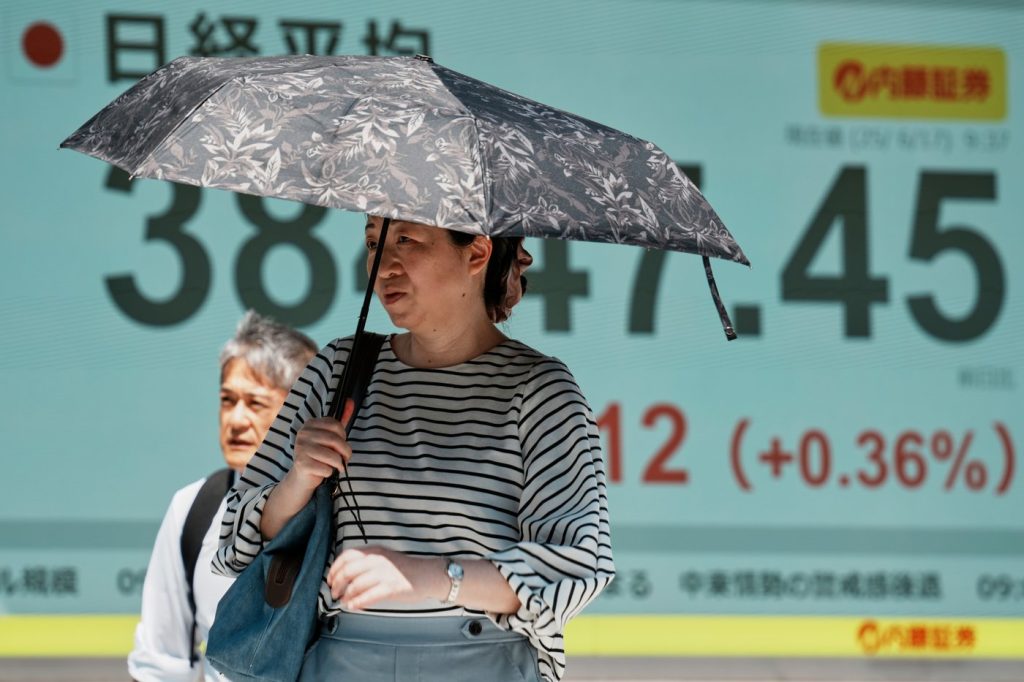BANGKOK (AP) – Oil prices have continued to rise, and U.S. futures experienced declines early Tuesday following a significant evacuation warning issued by Israel’s military for 330,000 individuals in Tehran, Iran's capital. The warning pertains to an area that contains key state infrastructure including the country's state television, police headquarters, and major hospitals, particularly one affiliated with the Iranian Revolutionary Guard.
As tensions escalate in the region, U.S. President Donald Trump decided to return from the G7 summit in Canada ahead of schedule amid the increasing hostilities. Early trading indicated that futures for the S&P 500 and the Dow Jones Industrial Average dropped by 0.3%. Meanwhile, in Asian markets, share performance was mixed.
Tokyo's Nikkei 225 index recorded a gain, climbing 0.6% to 38,547.56, spurred by the Bank of Japan's decision to maintain its key interest rate at 0.5%. The central bank signaled a cautious approach to economic recovery, citing a potential moderation in growth and indications of weakened consumer sentiment and housing investment.
The Bank of Japan highlighted uncertainty in trade conditions and the impact of foreign activity and pricing trends, reinforcing its wait-and-see stance regarding economic policies. Conversely, Chinese equities saw slight declines, with the Hong Kong Hang Seng index slipping 0.1% to 24,038.56 and the Shanghai Composite easing 0.2% to 3,382.14. In South Korea, the Kospi index increased by 0.4% to 2,956.88, while Australia’s S&P/ASX 500 slightly declined by 0.1% to 8,543.60.
As conflict continues between Israel and Iran, concerns persist regarding the potential for a wider war, which could disrupt Iran's oil exports and subsequently drive up global gasoline prices. Late last week, crude oil prices surged by 7% following Israel's military operations targeting Iranian nuclear and military objectives. On Tuesday, U.S. benchmark crude rose by 31 cents to $72.08 per barrel, while Brent crude increased by 33 cents to $73.56 per barrel.
On Wall Street, Monday's trading session reflected a more stable atmosphere, with the S&P 500 recovering by 0.9% to close at 6,033.11. The Dow Jones Industrial Average gained 0.8%, closing at 42,515.09, and the Nasdaq composite jumped 1.5% to finish at 19,701.21. Notably, U.S. Steel shares rose by 5.1% following Trump’s signing of an executive order that paves the way for a Japanese investment in the company. This deal grants Trump substantial influence over U.S. Steel’s operations.
Despite these positives, stock declines were observed among defense contractors, with Lockheed Martin and Northrop Grumman experiencing drops of 4% and 3.7%, respectively. Additionally, gold prices receded after their previous uptick, falling $14.60 to $3,402.40 per ounce, as investors sought more stable assets amidst geopolitical tensions.
Investors are also closely monitoring ongoing issues surrounding tariffs, initiated by President Trump, which pose risks of slowing economic growth and elevating inflation. These tariffs cast a shadow over the recent G7 summit discussions among major economies in Canada.
This week, the Federal Reserve is expected to address interest rate policies, with a crucial announcement slated for Wednesday. Analysts overwhelmingly predict that the Fed will maintain current interest rates, particularly in light of the economic pressures created by the tariffs and their effects on inflation, which has remained relatively stable and near the Fed's target of 2%.
As trading opened early Tuesday, the U.S. dollar weakened, dropping to 144.59 Japanese yen from 144.75, while the euro edged up to $1.1564 from the previous $1.1562.











